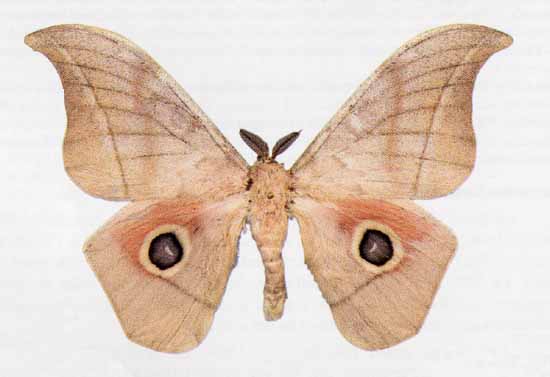Lobobunaea rosea werneri
Lobobunaea rosea werneri
loh-boh-BEWE-nay-uhM ROH-zee-uhM WER-ner-eye
Bouyer, 2001

Lobobunaea
rosea werneri male,
courtesy of Thierry Bouyer.
This site has been created by
Bill Oehlke at oehlkew@islandtelecom.com
Comments, suggestions and/or additional information are welcomed by Bill.
| TAXONOMY:
Superfamily: Bombycoidea, Latreille, 1802
Family: Saturniidae, Boisduval, [1837] 1834
Subfamily: Saturniinae, Boisduval, [1837] 1834
Tribe: Bunaeini, Packard, 1902
Genus: Lobobunaea, Packard, 1901
|
MIDI MUSIC
Wind Beneath My Wings
copyright C. Odenkirk
MIDI CITY
ON.OFF
<bgsound src="wings.mid" LOOP=FOREVER>
|
DISTRIBUTION:
Lobobunaea rosea werneri
(forewing length = 60-72mm, females slightly larger than males)
flies in southern
Tanzania and northern
Malawi, Africa at elevations of
approximately 4500 feet. This subspecies is
larger than nominate rosea (forewing length = 55-66mm) or
rosea thoirei (forewing length = 52-55mm).
FLIGHT TIMES AND PREFERRED FOOD PLANTS:
Lobobunaea
rosea werneri moths are on the wing from November to March.
Larvae probably feed upon Acocanthera, Anisophyllea laurina, Apodytes dimidiata, Eucalyptus, Eugenia
cordata, Rhus longifolia and Uapaca nitida.
ECLOSION, SCENTING AND MATING:
Lobobunaea rosea werneri
females attract males (more falcate wings) with an airbourne
pheromone.
EGGS, LARVAE AND PUPAE:
The pronunciation of scientific names is
troublesome for many. The "suggestion" at the top of the page is merely
a suggestion. It is based on commonly accepted English pronunciation
of Greek names and/or some fairly well accepted "rules" for latinized
scientific names.
The suggested pronunciations, on this page and on other pages, are
primarily put forward to assist those who hear with internal
ears as they read.
There are many collectors from different countries whose
intonations and accents would be different.
The genus name Lobobunaea, is from the Greek
and refers to a lobed hill-dweller. The genus specimen type is
Lobobunaea phaedusa, males of which have a valve with
a subapical lobe. The hindwings are also lobed at the anal angle.
It may also be a montane species.
The species name rosea refers to the rosy-pinkish cast
to this species.
The subspecies is named for Karl Werner who procured the specimens.
Larval Food Plants
Listed below are primary food plant(s) and alternate food plants listed in Stephen E.
Stone's Foodplants of World Saturniidae. It is hoped that this
alphabetical listing followed by the common name of the foodplant will
prove useful. The list is not exhaustive. Experimenting with closely
related foodplants is worthwhile.
Use your browser "Back" button to return to the previous page.
Go to Index for African Saturniidae
Go to Main Index for all Worldwide Saturniidae
